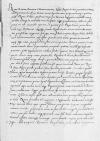⌊⌋ Reverendissimae Dominationis Vestrae paenultima Maii anni praeteriti ad me datas, nonis Aprilis anni praesentis accepi,
quibus mihi Reverendissima Dominatio Vestra, quod me nep<ot>i suo, ⌊domino Gasparo⌋, commendaverit scribit, eumque in omnibus meis negotiis mihi profuturum indicat, quam suam in me iuvando operam, et qualis sit, Reverendissimae Dominationi Vestrae prioribus litteris meis declaravi, quodque suasu Reverendissimae Dominationis Vestrae, licet invitus, ⌊Romam⌋ sim profectus, ingentes pro hoc tam fideli consilio Reverendissimae Dominationi Vestrae domino meo clementissimo ago gratias. Sentio enim modo, quantum commodi mihi haec mea peregrinatio futuris temporibus adferre posset, si mihi tantummodo tanti superessent sumptus, quibus relicto hoc nefando servitio, solo ingenuarum artium studio operam dare liceret, qua in re spero, immo mihi certo persuadeo, Reverendissimam Dominationem Vestram, dominum meum clementissimum, mihi inopi quemadmodum tum praesenti, tum etiam per litteras suas absenti, pollicita est, opem laturam. Nova, quae Reverendissimae Dominationi Vestrae digna scribi putem, praeter haec alia sunt nulla.
Sacram ⌊caesaream maiestatem⌋ hisce temporibus legatum suum, ut ipse ⌊pontifex⌋ propria persona concilio Tridentino intersit, misisse, quod nuntium summus pontifex, cum excusationem suam apud caesaream maiestatem nullius esse momenti cognovit, aegro animo tulit atque nepotem suum nomine ⌊cardinalem Fernesium⌋, modernum ⌊Regni⌋ protectorem, hoc in negotio veloci cursu ad caesaream maiestatem misit. Quid vero inde orietur novi, quamprimum experiar, Dominationi Vestrae Reverendissimae scribere non negligam.
⌊Alexander⌋ tredecimo (ante) Calendas Maii mecum lites coepit, quem brevi superinscribed⌈brevibrevi superinscribed⌉ poenam suis factis dignam accepturum minime dubito, perseverat enim in sua malitia, neque de sacramento (uti antea) quicquam credit, neque honorem eum, quem debet, cum eum aliquando divino officio interesse contingit, Sacrosancto Corpori Salvatoris nostri ⌊Iesu Christi⌋ exhibet. Praeterea, Reverendissime Domine, satis mirari non possumus
 UUB, H. 154, f. 94v
cum ⌊domino Gasparo⌋ calliditatem superinscribed⌈calliditatemcalliditatem superinscribed⌉ eius hominis, qui litteras Dominationis Vestrae Reverendissimae ad dominum Gasparum attulit, neque cur ⌊Romam⌋ venerit ab eo explorare potuimus, percontabatur tamen de ⌊Alexandro⌋ quam diligentissime cupiens eum alloqui, cum quo an locutus sit, scire nequeo, eumque aliquid in commissis ab aliquo ad Alexandrum habuisse existimo, sed nihil palam conari ausus est.
UUB, H. 154, f. 94v
cum ⌊domino Gasparo⌋ calliditatem superinscribed⌈calliditatemcalliditatem superinscribed⌉ eius hominis, qui litteras Dominationis Vestrae Reverendissimae ad dominum Gasparum attulit, neque cur ⌊Romam⌋ venerit ab eo explorare potuimus, percontabatur tamen de ⌊Alexandro⌋ quam diligentissime cupiens eum alloqui, cum quo an locutus sit, scire nequeo, eumque aliquid in commissis ab aliquo ad Alexandrum habuisse existimo, sed nihil palam conari ausus est.
Commendo me superinscribed⌈meme superinscribed⌉ gratiae et patrocinio Dominationis Vestrae Reverendissimae eamque longaevis temporibus salvam atque incolumem esse opto.
 UUB, H. 154, f. 94v
cum
UUB, H. 154, f. 94v
cum 

